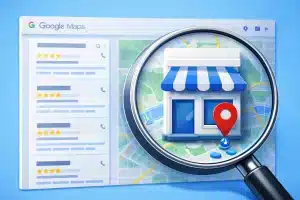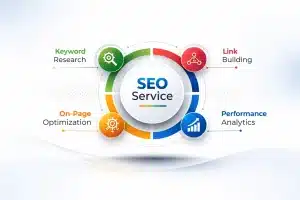Shopify is probably the most-used online store hosting service today. The tool fills an incredibly lucrative niche in the eCommerce services market. Shopify’s user-friendly plug-and-play functionality allows store owners to get their online retail platform up and running in a few hours. It is considered a blessing by most online vendors who do not have technical training.
However, some users dislike how expensive Shopify has become, while others don’t find the designs they want among the gallery of templates on the website. Luckily for us, Shopify still has to make itself the best option out of a surprising number of competitors, which most people sadly overlook.
Now, let's dive into this article to find out what are the top Shopify competitors.
What is Shopify?
If you are planning to take your business online and looking for an eCommerce platform that allows you to build, manage and run an online store, then Shopify is a good option to consider.
Shopify is one of the first eCommerce platforms. With years of experience hosting millions of merchants, Shopify is the leader in eCommerce. This platform forecasts and launches innovative eCommerce features that influence the industry. Shopify plays a major role in powering and shaping commerce today.
How does Shopify work?
Shopify provides you with a single platform for all of your commerce. This platform is designed to allow sellers to develop and personalize online stores. It allows them to integrate their eCommerce website with multiple channels. Using Shopify, merchants can sell in multiple places, including in-person, web, brick-and-mortar stores, through social media, pop-up shops, and various other widely trusted marketplaces.
The eCommerce platform is hosted and entirely cloud-based, offering easy use from anywhere. Shopify allows you to access your online store anywhere from a compatible device and an internet connection. The eCommerce platform takes care of software maintenance and upgrades for the merchants selling through Shopify. It means all you need is an internet connection to run your online store anywhere.
Be it online or in a physical store; a lot goes into managing customers, products, inventory, shipping, and payments. Shopify makes it easier by bringing many eCommerce tools into one place. This saves the business the time and hassle of putting different systems in place to deal with data.
There is a wide range of tools for businesses to choose from. Shopify allows you to integrate the specific technologies you need to run your business. The platform groups these technologies for easy access. You can integrate various business tools into your online store when you choose Shopify as your eCommerce platform. Successful businesses use Shopify as the layer to build the right business tool stack.
13 Shopify competitors and alternatives
Scroll down to see our curated list of the best eCommerce websites that are Shopify competitors, and compare the pros and cons to find what works best for the needs of your eCommerce enterprise.
-
WooCommerce
Giving WooCommerce a first trial run will be enough to show why many eCommerce entrepreneurs have difficulty choosing between Shopify and WooCommerce. WooCommerce is one of the Shopify competitors and it has a clear edge in more than one service aspect. Being open-source, WooCommerce is already more trustworthy as software than Shopify. When software is open-source, the code it's running on is available to the public for scrutiny, and there is no built-in spyware.
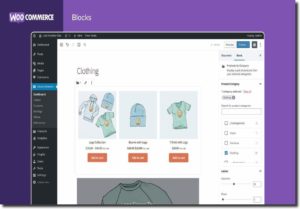
Source: WooCommerce
Secondly, WooCommerce has many free features, only requiring users to pay for extra functionality goodies. A final win for WooCommerce is the service’s integration with WordPress, a popular website–building platform. But these are only a few features that make WooCommerce a top competitor for Shopify. Head to the WooCommerce website to check out their full arsenal of utility and styles!
-
BigCommerce
BigCommerce is where two very specific market needs come together: ease of use and magnitude. It is one of the toughest Shopify competitors. For instance, UI design for BigCommerce users is simplified to drag-and-drop mechanics, and many tools are at your disposal to market your product better than ever and reach your best lead-conversion rates. And if you’re a little more tech-savvy than the average Joe, BigCommerce has free and very useful SEO tools that help you make your store increasingly attractive with time.
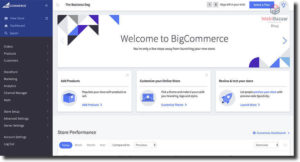
Source: BigCommerce
-
Squarespace
This one is for the minimalists. Squarespace’s most unique offering is the clean, ultramodern, minimalist aesthetic. If your business targets the sober but stylish consumer and your product lineup isn’t too large, Squarespace might be the right option for you in this list of top competitors.
The features offered are far from minimalistic, however. For only around $26 a month, users can create unlimited blogs and galleries and get a free web domain and large cloud storage for their business. Ease-of-use is again a priority, but advanced mechanics like AdWords, MailChimp, and tracking for Amazon affiliates are offered for those who know how to use them. All these features make Squarespace one of the best Shopify competitors.

Source: Squarespace
-
Wix
An eCommerce classic, Wix is a tough one of the Shopify competitors that allows the creation of robust, featureful stores compatible with a host of browsing platforms. The design options are rich, extensive, and easy to use, with the feasibility of drag-and-drop. All templates can be used even by users on the free plan, which makes Wix one of the top Shopify competitors when discussing stocks.
Their plans include an unlimited product lineup, abandoned cart recovery, and an online booking platform for businesses in the services industry. Wix also supports channels for customer support around the clock. Some pricier plans include added features such as unlimited cloud storage and unlimited length of video content. For smaller businesses, Wix will almost always come out on top as an alternative much cheaper than Shopify and many Shopify competitors.

Source: Wix.com
-
Shift4Shop
Shift4Shop is yet one of the other Shopify competitors that are capable of accommodating businesses of just about any type and size. The website building tool is efficient and easy to use. A wide range of customizable design templates is also offered, with some specifically designed to be used in certain industries.
Marketers and entrepreneurs who make SEO their primary plan for progress often report that Shift4Shop is far more functional to them than Shopify.
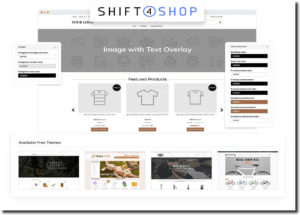
Source: Shift4Shop
While none of the plans are too expensive, business owners in the US get a special free plan that unlocks all Shift4Shop features but requires the store to use Shift4Shop as their payment processor. This makes Shift4Shop one of the top Shopify competitors' stocks.
-
Zyro
A rapidly increasing number of people deem Zyro an underrated gem of a newcomer in the lineup of Shopify competitors. While the design options are fairly limited and much other building and hosting features are not offered, the pricing plans are very aggressive.
For only around $15 a month, Zyro users get a free domain for their business, a 24/7 customer support channel, more than 20 payment options, bookings, and cyber shelves to accommodate up to 100 products. Users get added features for a slightly pricier plan and can market their products on social media outlets like Facebook and Instagram.

Source: Zyro
Website building is fun and AI-assisted, along with a suite for logo design and content creation. Zyro deserves to be on the list of eCommerce resources for everyone looking to initiate their startup nowadays.
-
Magento
Magento is another choice for open-source software enthusiasts looking to create a store online. Magento is technically free but doesn’t provide you with hosting services. Your store needs to be hosted on a third-party server that will charge you monthly for web hosting.
Magento is not very difficult to operate if you have a developer or development team working for you. For individuals unfamiliar with coding, accessing the full eCommerce potential of Magento will most likely end up being too complicated.
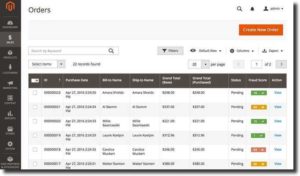
Source: Magento
If you can get past the obstacles of basic coding knowledge, Magento offers a surprisingly vast array of design tools and the freedom to customize. Alternatively, you can go through the pre-designed themes offered by Magento and see if you find something that fits the public face of your business.
Magento is not one of the Shopify competitors if you are a beginner or someone who doesn't want to spend time coding.
-
Sellfy
If your main products are digital or software, you should consider Sellfy as one of the best Shopify competitors. Sellfy is the best hosting service if your store targets a demographic or community that isn’t too large.

Source: Sellfy
The website building tools offered by Sellfy are simplistic and don’t encourage heavy customization. But many people are willing to go with it for the attractive pricing options. Unlike Shopify, Sellfy does not charge its clients transaction fees. They also have a free plan that lets you sell up to 10 physical products.
The print-on-demand functionality is another feature almost unique to Sellfy. Most eCommerce platforms require add-ons or extensions (which are not free a lot of the time) to let store owners manage printing in response to orders received.
Sellfy is a popular choice among digital services sellers to manage sales, often coupled with separate social media outlets or websites belonging to the seller.
-
Ecwid
Ecwid started as a widget that you could incorporate into your website to boost eCommerce functions. Now, it has evolved into a standalone website-building tool. However, you can still plug it into other website-building tools as a widget. This means you can use the abilities of any website building platform you prefer and turn it into an eCommerce outlet using Ecwid.
Ecwid offers four pricing plans, ranging from $82.50 a month to no cost. The free plan is pretty useful for a small business or independent creator-seller. One important option missing is the ability to sell services on social media websites. More functions and a larger product range are unlocked if you’re willing to invest in a costlier plan.
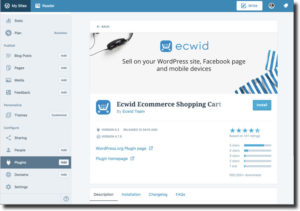
Source: Ecwid
A big downside is that the customer support you get from Ecwid is also dependent on what plan you’re subscribed to. So you might have to rely on help from fellow users in the Ecwid community if you run into technical problems.
-
PinnacleCart
PinnacleCart boasts extreme ease of use and functionality to accommodate businesses of many sizes. The entire building and store management process can be handled with one resourceful dashboard, which is surprisingly simple and organized.
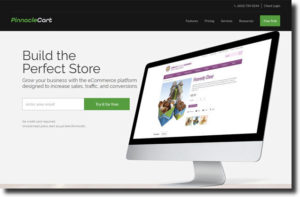
Source: PinnacleCart
If you sign up to use PruPay as your payment channel, you can get the Standard plan for free, which is otherwise $79.95 a month. The advanced plan costs $199.95 a month. There’s also an Enterprise plan, but PinnacleCart does not have the price listed. Instead, you have to get a quote, and the price will presumably depend on your business's current size and plans for the future.
-
PrestaShop
PrestaShop gives you extensive personalization ability for your store. It is relatively easy to set up, and tutorials are available to make the process even easier for you. PrestaShop can be downloaded free of cost, but you have to pay for web hosting and a security certificate.
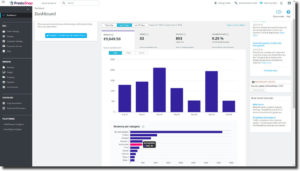
Source: PrestaShop
Using PrestaShop to build your eCommerce store will save money in transaction fees, which is not the case with Shopify. The cost plans are more flexible since you have to pay for individual add-ons that integrate into your website and provide one or more additional features.
-
Weebly
Weebly is an all-around website builder with some dedicated plans that lend eCommerce functionality to it. So the tool is not meant to be used as a full-fledged online store builder and is best used for stores run by small businesses.
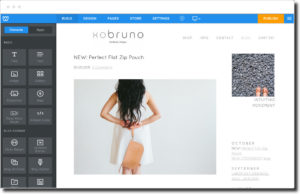
Source: Weebly
You can choose from all the design features of a versatile web design platform. Weebly is also extremely easy and convenient to use. It allows drag-and-drop mechanics for the design process. Users get total freedom and control over many elements that make up their website. A unique and interesting feature is that store owners can approve credit card transactions even when not connected to the internet.
Weebly is beloved by small businesses because of its feature-packed free plan and the option to upgrade to paid plans only if you want extended features.
-
Volusion
Volusion allows users to set up their online store in a very simple process. And on top of being easy to use, Volusion also offers customer support 24/7.
The pricing plans are very similar to the ones Shopify offers. This is a little unfair since Volusion does not allow equal growth options to users. The number of themes, integrated add-ons, and built-in design features is very limited compared to Shopify.

Source: Volusion
However, Volusion supports an equally large number of payment processors and does not charge transaction commissions. This makes it extremely desirable to small businesses as they don’t have a lot of unique design needs and would much rather prefer a service provider who is not taking a percentage of their earnings on top of the overhead costs they are already bearing.
Why Is Shopify Better Than Other Platforms?
-
Support For The Ecommerce Community
Shopify supports the eCommerce community like no other platform. It allows businesses to run online, offline, or anywhere in between. This is why Shopify is the first choice of merchants, developers, and businesses for leveraging trades of all sizes.
-
Available Globally
Shopify is not limited to one region. It offers ease of trade to businesspeople and entrepreneurs from all across the globe. It allows them to establish their online presence, connect with the right audience and grow their business. Shopify merchants span over 175 countries. It equips entrepreneurs with the best tools and building blocks to get their eCommerce business up and running.
-
Empowering Creative Expression
Shopify promotes creativity. The platforms offer flexibility and scalability to entrepreneurs of all sizes, regardless of the nature of the operation. Shopify eCommerce stores can be customized to an unbelievably great extent. The platform encourages freedom of expression.
-
Innovative eCommerce Platform
Shopify uses a shared technical framework to build a broad range of eCommerce ecosystem integrations. It goes beyond centralizing the entire commerce business by offering useful integrations and access to various customizable eCommerce elements such as themes and experiences. It also ensures that the seller has easy access to all apps, channels, products, and experiences at your disposal with just a click.
-
No Unnecessary Complexity
As mentioned earlier, establishing, running, scaling, and growing a business takes a lot. Shopify takes the hassle out of the process by providing entrepreneurs access to the most powerful growth tools.
-
Build Your Business To Scale
Shopify ensures that businesses built on the platform have access to the technology and the features to scale their business once it is established. Shopify will accommodate your business’s needs regardless of the complexity, technical, maturity, or size.
-
Ease To Create Business Anywhere
Shopify allows you to create the ultimate eCommerce experience from scratch. No matter your vision, dream, or idea, the eCommerce website builder will help you turn it into a reality.
- Shopify provides tons of tools to create a customized front-end for your website. You can create a seamless, unique, and user-friendly online visitor experience.
- Shopify makes it easier to market your business. It offers you a centralized place to market and sell your products across different social media channels. You can integrate the platform with social media and popular marketplaces to target and sell to your audience.
- Shopify provides a digital shopping assistant as a Shop App. It allows customers to track their orders and access shipment details and checkout. It keeps them in touch with the business by allowing them to rediscover it when needed.
- Shopify is the one-stop solution to all your business’s online or offline needs. It allows you to use consumers’ data to sell in person. It offers an all-inclusive POS system to ensure frictionless retail operations. This system lets you manage everything from staff to stock and customers. Using the data, you need to sell online, you can create a frictionless shopping experience for your customers.
- Shopify has the best set of tools for content creators. It empowers with the tools that make producing and marketing content easy. This eCommerce platform is your road to building a thriving business.
- You can use content and data to tell your brand’s story. You can create a stand-out experience for your buyers by using support for media files, meta fields, and other foundational elements.
Key Takeaway
We know finding the perfect eCommerce platform can be a difficult task for growing businesses. But it always pays to assess your options rather than just going for the biggest, most popular brand name at the time.
All of the eCommerce tools and services discussed in this article work pretty well as hosts for any online store, and yet you will find large fan bases and harsh criticism for each one. This is because even if multiple options are “good,” you have to put in the effort to research and find the one that fits best with the needs, budget, resources, and skills inherent to your business.
Tags: shopify alternatives, shopify competitors, shopify competitors and alternatives

